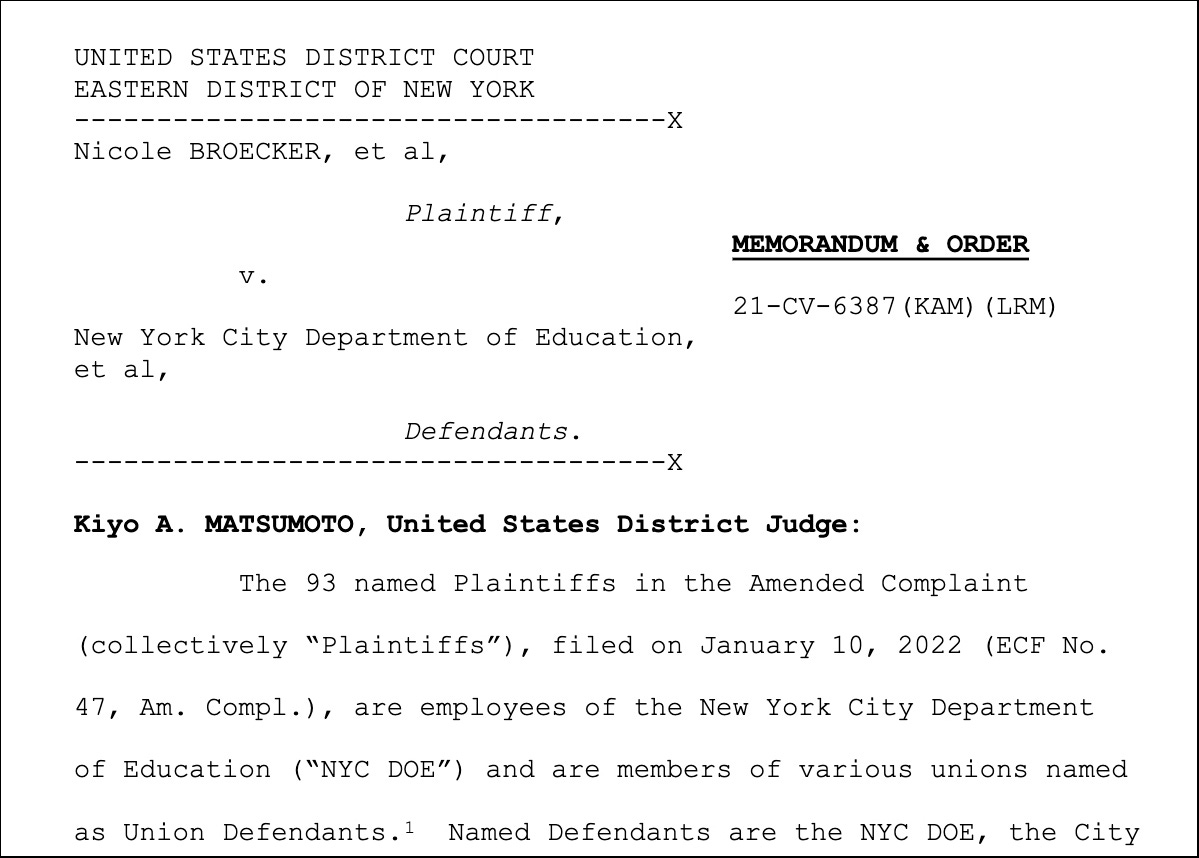Broecker v. New York City Department of Education Federal Suit Dismissed, but Plaintiffs Are Still Fighting to Appeal
The federal lawsuit brought by 93 NYC Department of Education employees terminated under the vaccine mandate argued core issues relevant to many other cases.
UPDATE: The plaintiffs filed a notice of appeal with the U.S. Court Of Appeals, Second Circuit on April 20, 2023.
The federal Garvey v. Adams lawsuit isn’t the only major case to face dismissal recently by U.S. District Court Judge for the Eastern District of New York Kiyo Matsumoto.
On March 30, Matsumoto also dismissed one of the earliest and most complex of the lawsuits brought against New York City’s vaccine mandates, Broecker et al v. New York City Department of Education et al.
Plaintiffs’ attorney Austin Graff commented on the dismissal in this article by Teachers for Choice, and you can read the full court decision there too. The case was dismissed with prejudice, meaning that the 93 plaintiffs can’t bring the same complaint back to federal court again.
But Plaintiffs Are Still Trying to Fund an Appeal
The plaintiffs do have the option of appealing the dismissal to a higher court. Whether that will happen appears uncertain at this point. They have 30 days from the date of dismissal to file an appeal, and they’re running a GiveSendGo campaign to raise funds for it (you can find more information on that in the Teachers for Choice article).
With just a couple weeks left before the appeal deadline, they still seem to be far short of their funding goal, and it’s not clear what will happen if they don’t reach it.
Why the Broecker Case Matters
The Broecker lawsuit was originally filed back in November 2021, against a lengthy list of defendants:
NEW YORK CITY DEPARTMENT OF EDUCATION,
MEISHA PORTER, in her official and individual
capacities, UNITED FEDERATION OF TEACHERS,
LOCAL 2, AMERICAN FEDERATION OF
TEACHERS, AFL-CIO, MICHAEL MULGREW, in his
official and individual capacities, COUNCIL OF
SUPERVISORS AND ADMINISTRATORS, MARK
CANNIZZARO, in his official and individual capacities,
DISTRICT COUNCIL 37, AFSCME AFL-CIO,
HENRY GARRIDO, in his official and individual
capacities, DISTRICT COUNCIL 37, AFSCME AFL-
CIO, LOCAL 372, SHAUN D. FRANCOIS I, in his
official and individual capacities, DISTRICT COUNCIL
37, AFSCME AFL-CIO, LOCAL 1251, FRANCINE
FRANCIS, in her official and individual capacities,
MARTIN F. SCHEINMAN, SCHEINMAN
ARBITRATION AND MEDIATION SERVICES,
SCHEINMAN ARBITRATION AND MEDIATION
SERVICES, LLC, JOHN DOE #1-10, in their official
and individual capacities; and JANE DOE #1-10 in their
official and individual capacities.
The suit took aim at what might be considered one of the founding documents of the New York City vaccine mandate regime: the Impact Arbitration Award created by arbitrator Martin Scheinman after negotiations between the DOE and the United Federation of Teachers broke down.
The Award detailed the processes for putting DOE employees on leave without pay and terminating their employment under the mandate, and it served as a template for the processes adopted for other New York City employees.
In both the Broecker case and many other mandate-related cases brought in New York State courts, the question of whether Scheinman had the authority to dictate these processes and treat the mandate as a newly minted condition of employment has been a core legal issue.
Attorneys in this case and others have argued that he did not, and that putting DOE employees on leave without pay and firing them were in fact disciplinary actions in which the employees’ due process rights were denied. The Broecker complaint accuses the defendants, including the workers’ unions, of colluding to deprive employees of their rights.
In fact, public school employees have some of the most robust labor and due process protections in the state of New York, especially if they have tenure. They’re protected not just by the state constitution and New York State Civil Service Law, but also by New York State Education Law, their union contract, and a raft of other state and local protections.
So What Makes It a Federal Case?
Whether all of those protections could legally be swept aside by executive orders and arbitration agreements is one of the fundamental questions of the mandate era, and that’s what made this a federal case. Like the federal Garvey lawsuit, Broecker made a difficult 14th amendment argument, this time under the due process clause.
The Broecker complaint contended that DOE employees were denied their due process rights under the U.S. Constitution when the defendants pulled the old switcheroo and substituted the Impact Arbitration Award’s processes for the voluminous state and contractual due process protections.
In her decision, Judge Matsumoto ultimately disagreed:
“As before, the Court finds that the processes available to Plaintiffs, including but not limited to statutes and contractual procedures, are constitutionally sufficient.”
There’s a lot more to the Broecker case. It’s complex, and I’m just giving you some broad strokes here. I’m sure I’ll be revisiting it in the future, especially if an appeal gets filed at the end of this month. I’ll let you know if it does.




Yep the unions sold out their members for absolutely nothing.
They bargained for nothing in return and pretended like they were doing this for the good of the union's future.
I don't see this as innocent or a mistake. It's malfeasance.